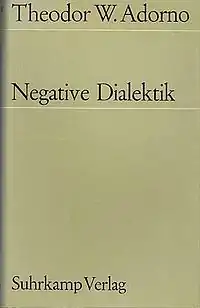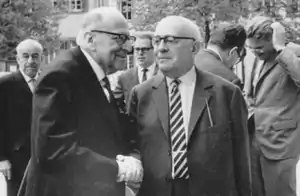 Cover of the first edition | |
| Author | Theodor W. Adorno |
|---|---|
| Original title | Negative Dialektik |
| Translator | E. B. Ashton |
| Language | German |
| Subject | Philosophy |
| Publisher | Suhrkamp Verlag |
Publication date | 1966 |
| Media type | |
| Pages | 416 (Routledge edition) |
| ISBN | 0-415-05221-1 (Routledge edition) |
| Part of a series on the |
| Frankfurt School |
|---|
 |
Negative Dialectics (German: Negative Dialektik) is a 1966 book by the philosopher Theodor W. Adorno.
Summary
Adorno sought to update the philosophical process known as the dialectic, freeing it from traits previously attributed to it that he believed to be fictive. For Georg Wilhelm Friedrich Hegel, the dialectic was a process of realization that things contain their own negation and through this realization the parts are sublated into something greater. Adorno's dialectics rejected this positive element wherein the result was something greater than the parts that preceded and argued for a dialectics which produced something essentially negative. Adorno wrote that "Negative Dialectics is a phrase that flouts tradition. As early as Plato, dialectics meant to achieve something positive by means of negation; the thought figure of the 'negation of the negation' later became the succinct term. This book seeks to free dialectics from such affirmative traits without reducing its determinacy."[1]
Adorno's purpose was to overcome the formal logical limits of the previous definitions of dialectics by putting into light that new knowledge arises less from a Hegelian unification of opposite categories as defined following Aristotelian logic than by the revelation of the limits of knowledge.[2] Such a revelation reaches out to its experienced object, whose entirety always escapes the simplifying categories of purely theoretical thinking.[3] Adorno raises the possibility that philosophy and its essential link to reality may be essentially epistemological in nature.[4] His reflection moves a step higher by applying the concept of dialectics not only to exterior objects of knowledge, but to the process of thought itself.[5]
To summarize, "...this Negative Dialectics in which all esthetic topics are shunned might be called an “anti-system.” It attempts by means of logical consistency to substitute for the unity principle, and for the paramountcy of the superordinate concept, the idea of what would be outside the sway of such unity. To use the strength of the subject to break through the fallacy of constitutive subjectivity—this is what the author felt to be his task [...]. Stringently to transcend the official separation of pure philosophy and the substantive or formally scientific realm was one of his determining motives."[6]
Influence
Adorno's work has had a large impact on cultural criticism, particularly through Adorno's analysis of popular culture and the culture industry.[7] Adorno's account of dialectics has influenced Joel Kovel,[8] the sociologist John Holloway, the anarcho-primitivist philosopher John Zerzan,[9] the sociologist Boike Rehbein,[10] and the Austrian musicologist Sebastian Wedler.[11]
References
- ↑ Adorno, Theodor W. (1990). Negative Dialectics. London: Routledge. p. xix. ISBN 0-415-05221-1.
- ↑ See quote
We are blaming the method for the fault of the matter when we object to dialectics on the ground (repeated from Hegel’s Aristotelian critics on) that whatever happens to come into the dialectical mill will be reduced to the merely logical form of contradiction, and that (an argument still advanced by Croce) the full diversity of the noncontradictory, of that which is simply differentiated, will be ignored.
— Theodor W. Adorno, Negative Dialectics, Preface - ↑ See quote
[(The name of) dialectics] indicates the untruth of identity, the fact that the concept does not exhaust the thing conceived.
— Theodor W. Adorno, Negative Dialectics, Preface - ↑ See quote
Having broken its pledge to be as one with reality or at the point of realization, philosophy is obliged ruthlessly to criticize itself.
— Theodor W. Adorno, Negative Dialectics, Preface - ↑ See quote
The plain contradictoriness of this challenge is that of philosophy itself, which is thereby qualified as dialectics before getting entangled in its individual contradictions. The work of philosophical self-reflection consists in unraveling that paradox.
— Theodor W. Adorno, Negative Dialectics, Preface - ↑ Adorno, Theodor W., 1903-1969. (1983) [1973]. Negative dialectics. New York: Continuum. ISBN 978-1-4411-3523-0. OCLC 741691296.
{{cite book}}: CS1 maint: multiple names: authors list (link) CS1 maint: numeric names: authors list (link) - ↑ James Bohman (1999). Robert Audi (ed.). The Cambridge Dictionary of Philosophy. Cambridge: Cambridge University Press. p. 10. ISBN 0-521-63722-8.
- ↑ Kovel, Joel (1991). History and Spirit: An Inquiry into the Philosophy of Liberation. Boston: Beacon Press. p. 261. ISBN 0-8070-2916-5.
- ↑ "John Zerzan: Anti-civilization theorist, writer and speaker".
- ↑ Rehbein, Boike (2015-03-24). Critical Theory After the Rise of the Global South: Kaleidoscopic Dialectic (1 ed.). Routledge. doi:10.4324/9781315718934. ISBN 978-1-315-71893-4.
- ↑ John Holloway. Negativity and Revolution: Adorno and Political Activism (2008) ISBN 978-0-7453-2836-2, ed. with Fernando Matamoros & Sergio Tischler
Further reading
- Dennis Redmond's updated translation of Negative Dialectics, with commentary.
- Buck-Morss, Susan. Origin of Negative Dialectics. Free Press, 1979.
- Jameson, Fredric. Late Marxism: Adorno or the Persistence of the Dialectic. Verso, 2007.
- Boucher, Geoff. Adorno Reframed. I.B. Tauris, 2013.